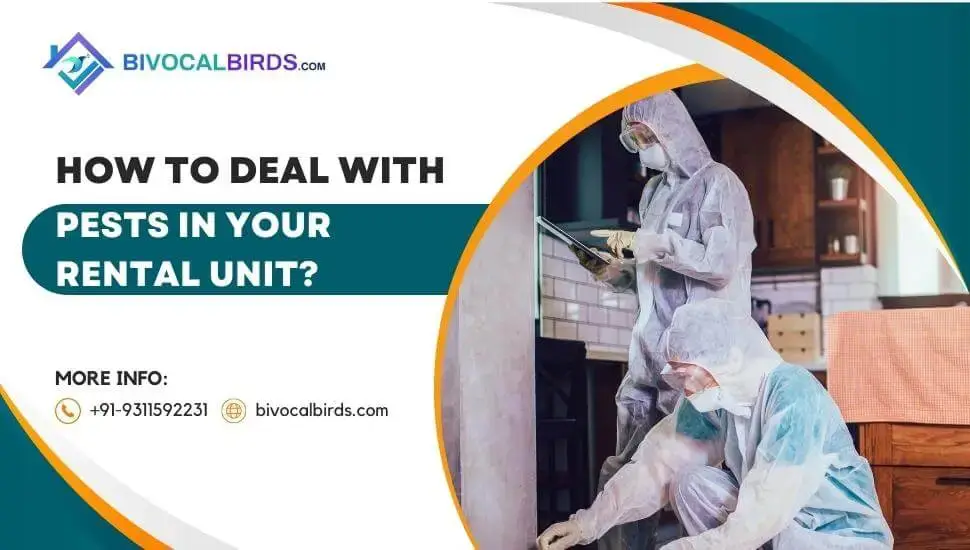How to Deal with Pests in Your Rental Property ?
 23-Sep-2023
23-Sep-2023Pests like cockroaches, bed bugs, termites, and rats are common intruders into homes and rental apartments in India. Getting rid of them once they infest your living space can be difficult and expensive. As a tenant, you need smart strategies to prevent and eradicate pests effectively when they invade your rental. Here are practical tips on tackling different types of pest infestations in your apartment while avoiding conflicts with the landlord.
Inspect for Signs of Pests Before Renting
When apartment hunting, check carefully for any signs of current or past pest infestations before finalizing a rental unit. Look for droppings, chew marks, strange odours, insect egg casings, termite mounds, etc., in corners, under sinks, and wall crevices. Also ask the landlord and neighbors specifically regarding pests. It’s much easier to prevent infestation rather than remove pests after you move in.
Map Entry Points and Keep Them Sealed
Walk around your apartment and map all potential entry points for pests like cracks, gaps around pipes, loose screens, etc. Use cement, steel wool, wire mesh, etc., to seal these access points tightly so pests can't sneak in. This "pest-proofing" prevents issues down the road. Check seals regularly to identify and close new gaps that appear.
Also Read - 7 Steps to Clean Your Living Room
Store Food Items in Airtight Containers
Don’t give pests a reason to enter your apartment. Store all food grains, spices, and snacks in sealed bins and containers rather than bags or boxes. Clean up food spills quickly and regularly clean cabinets, drawers and kitchen surfaces to remove any residue that can attract pests. Follow good sanitation practices.
Take Away Their Survival Essentials
Pests need food, water and shelter to thrive. Apart from sealing entry points and removing food sources, fixing any plumbing leaks and drying out damp areas to eliminate drinking water sources for pests. Reduce clutter like stacks of paper and cardboard that provide ideal hiding and nesting spots inside your unit.
Know DIY Solutions for Common Pests
For minor pest issues, there are some effective DIY solutions you can try without involving the landlord:
Cockroaches - Borax powder, diatomaceous earth
Ants- Vinegar, cinnamon, lemon juice, turmeric
Mosquitoes - Neem, citronella, eucalyptus oil
Bed Bugs – Vacuuming, essential oil sprays
However, don’t overuse chemical pesticides or introduce hazards. Seek expert help for severe cases.
Discuss Pest Control Responsibilities in Advance
Review your rental agreement to understand pest control responsibilities for the landlord versus tenant. Typically, the landlord handles termite, rat and other structural infestations while you manage occasional pests like ants using safer DIY measures. Reach clarity in advance on who pays for pest control services to avoid misunderstandings.
Report Significant Outbreaks Immediately
Don’t delay notifying the landlord in writing if you discover a major pest problem like termite patches multiplying rapidly or cockroaches overrunning your kitchen. The longer you wait, the more established the infestation can become. Early intervention by professionals before it gets out of hand is key. Follow up diligently until the issue is resolved.
Also Read - Top Ways to Save Money While Moving to a New Home
Hire Your Own Pest Control if Landlord Drags Feet
If the rental agreement makes the landlord responsible for handling significant pest issues but they delay taking action, send a final written notice stating you will appoint your own professional and deduct charges from rent. This often motivates unresponsive landlords to tackle the problem promptly. Of course, discuss deducting rent only after consulting an attorney.
Use Legal Recourse as a Last Resort
If the landlord completely refuses to address a pest issue they are contractually obligated to handle, you can take legal recourse through local tenant authorities. File a complaint explaining the pest infestation and how the landlord violated agreement terms by not resolving it. The authorities can impose penalties to compel the landlord to act. But try to avoid outright legal disputes if possible.
Shift if the Landlord Still Doesn’t Cooperate
As a last resort, if the landlord refuses to fix a severe pest problem in your unit that makes living conditions hazardous, start hunting for alternative rental options. No rental is worth risking your health and well-being over. Ensure you document pest infestation issues thoroughly, as you may need evidence if the landlord contests terminating the lease prematurely.
Take preventative measures, act quickly at first signs of pests, and persist with reasonable pest control demands to ensure your landlord tackles issues promptly. With these practical tips, you can keep rental pests under control and maintain a healthy living environment. Don’t live with vermin just because you are a tenant!
For further information, You Can Call us or Email us at support@bivocalbirds.com.



